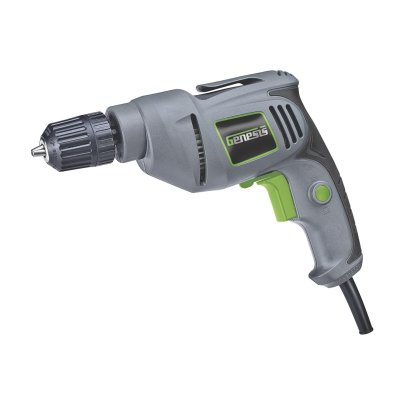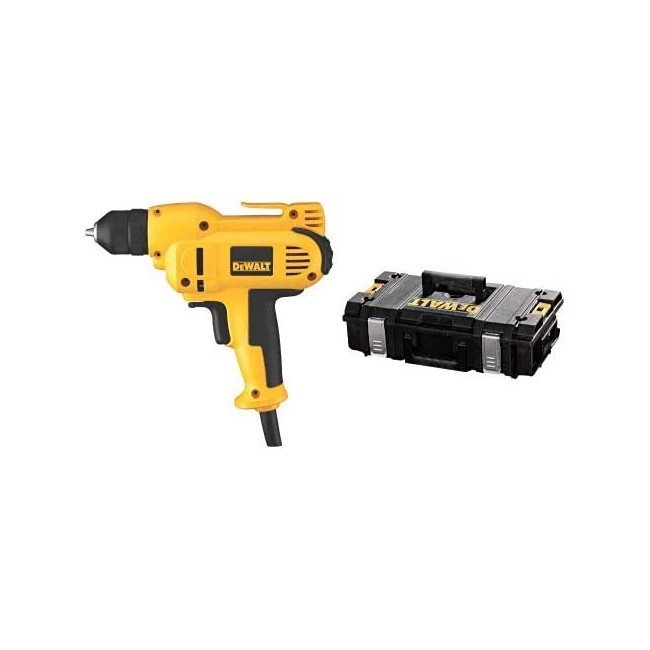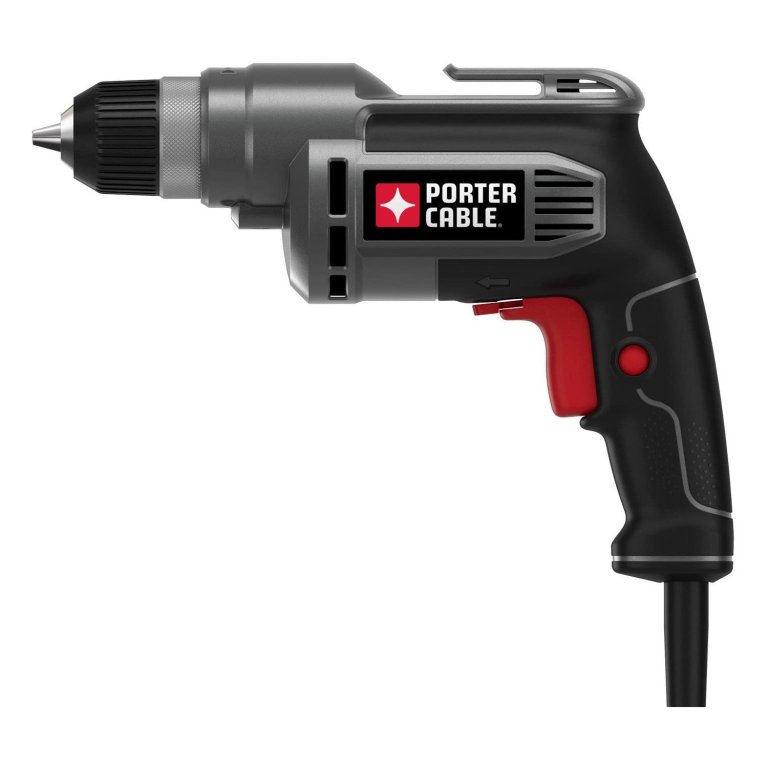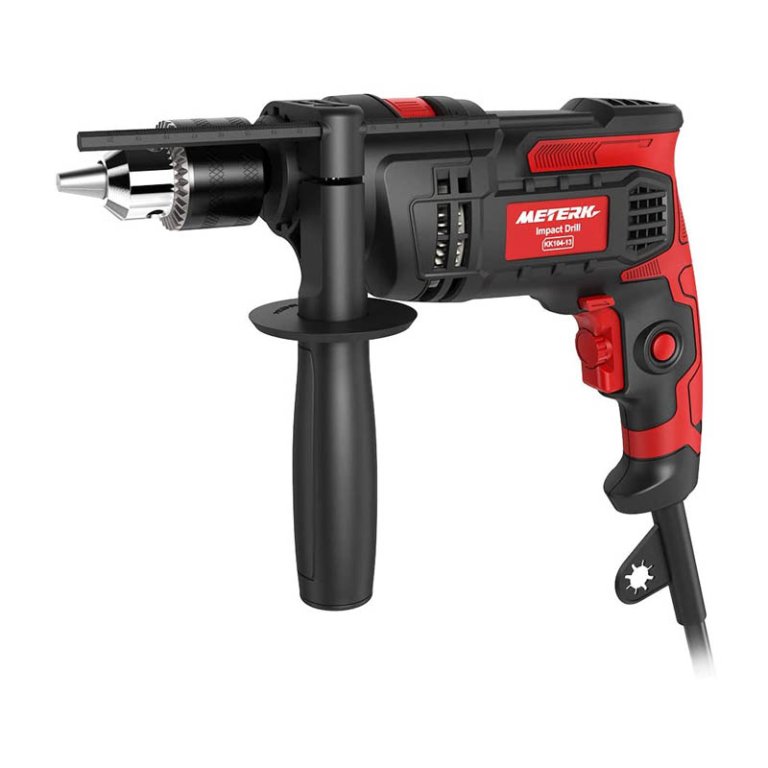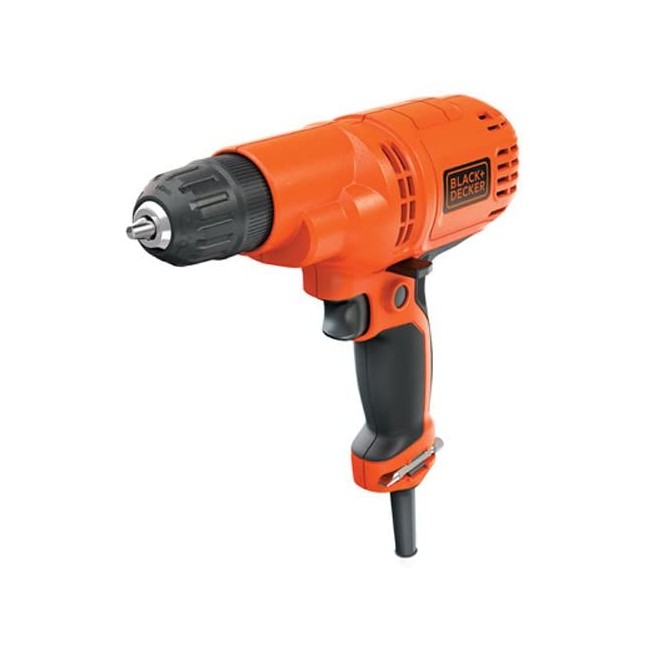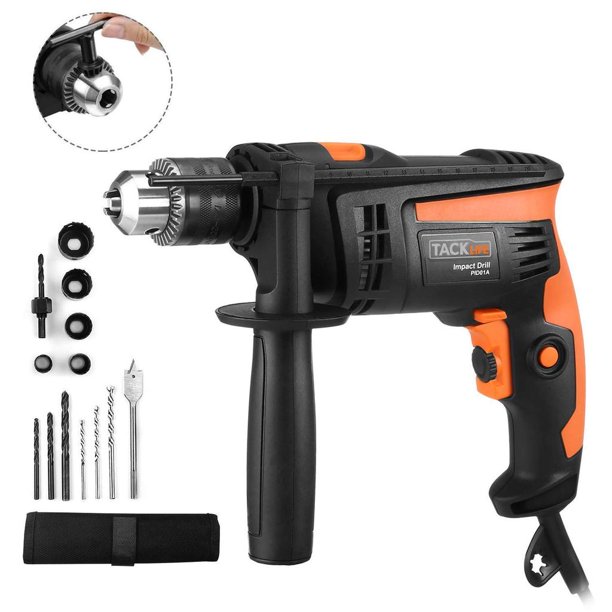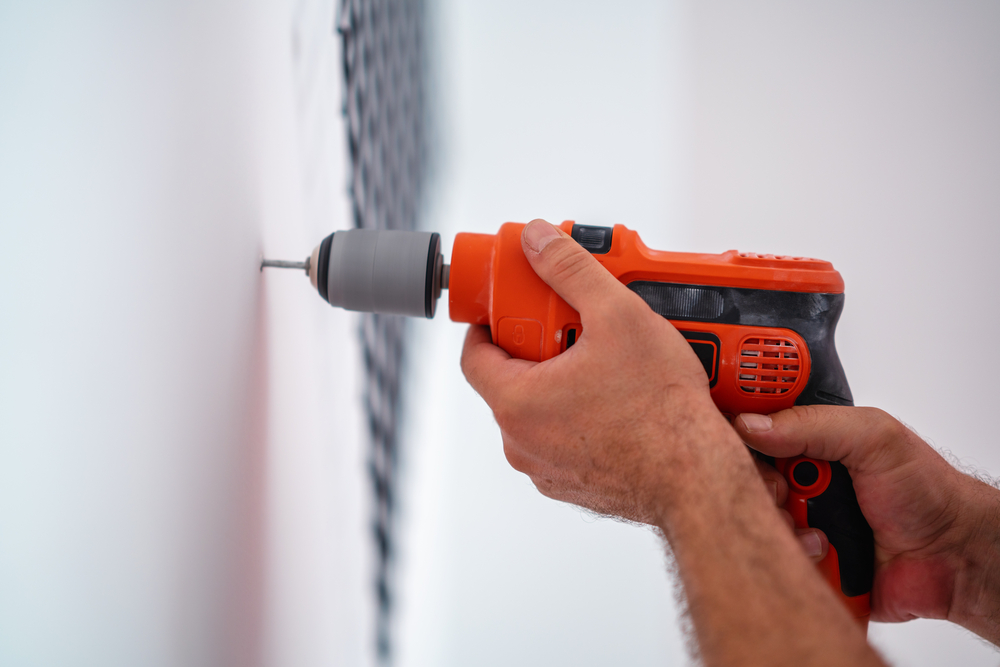
We may earn revenue from the products available on this page and participate in affiliate programs. Learn More ›
Despite the advancements in cordless drill battery technology, the best ones aren’t powerful enough to do the job. Drilling 1/2-inch holes in hardwood, burrowing through steel: those feats require the power of a corded drill.
While the top cordless drill maxes out at 300 watts and requires a periodic battery charge, the best corded drill will produce nearly 900 watts, generating significantly more torque. The best corded drill is a useful tool for home projects and an essential in the workshop. Below, you’ll discover why these picks are some of the best on the market.
- BEST OVERALL: DEWALT DWD115K 8 Amp VSR Drill Kit
- RUNNER UP: PORTER-CABLE Corded Drill, 6-Amp, (PC600D)
- BEST VALUE: Genesis GD38B Variable Speed Reversible Electric Drill
- UPGRADE PICK: Meterk 7.0 Amp Corded Hammer Drill
- BEST LIGHTWEIGHT: BLACK+DECKER Corded Drill, 5.2-Amp, 3/8-inch (DR260C)
- BEST 1/2-INCH DRILL: SKIL 6335-02 7.0 AMP 1/2 In. Corded Drill
- BEST HAMMER DRILL: Tacklife 1/2-Inch Electric Hammer Drill
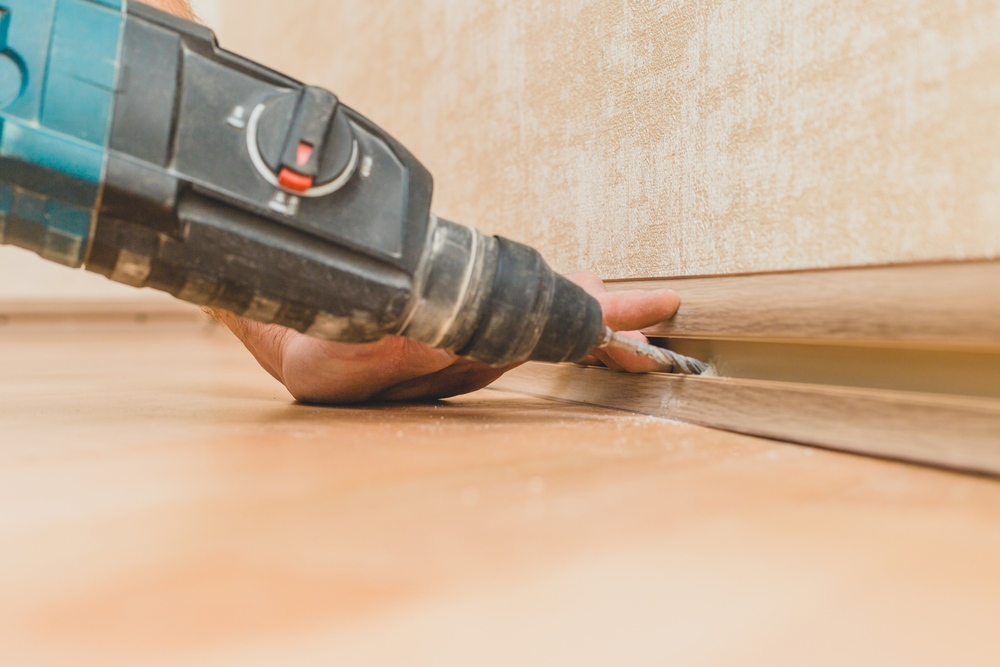
What to Consider When Choosing the Best Corded Drill
When it comes to power tools, most users focus on the motor’s size, and corded drills are no exception. And while the axiom “the more power, the better” does hold true with corded drills, it’s not the only thing to consider. Characteristics such as size, weight, chuck size, and rotation speed also play a significant role in how well a drill performs.
Chuck Size
The chuck is the clamp at the business end of the drill that holds the bit in place. Chucks usually use a locking key to grip the shank end of a drill bit. For power drills, chucks come in three sizes: 1/4-inch, 3/8-inch, and 1/2-inch. The size determines the maximum diameter drill bit shank a chuck can hold. Keep in mind that most bits use a slightly smaller shank than the actual size of the drill bit. This means a 3/8-inch chuck allows you to use a 1/2-inch bit with a 3/8-inch shank.
A drill with a 3/8-inch chuck size is large enough to handle most home projects. Massive 1/2-inch models are often used by professionals due to their heavy-duty construction and ability to handle larger drill bits.
Motor Power
Power is what separates corded drills from their cordless cousins. While the most powerful corded drills draw from a 20-volt rechargeable battery, corded drills can access a 110-volt electricity supply for as long as the unit is connected to the power source.
Corded power drill motors are rated by amps. To determine how powerful a drill’s motor is, multiply the motor’s amp rating by the power supply’s maximum power output. A corded drill with a 5-amp motor, for example, has a max output of 550 watts (5 amps x 110 volts = 550 watts). The more powerful the motor, the more torque the drill produces, and the easier it will drill through material. This makes for a more precise hole.
While power is important, torque is also a crucial factor. Torque, measured in pounds-feet, determines the drill’s twisting power. The higher the torque, the easier it is for the bit to cut through the material. Torque is essential when drilling holes through materials such as metal and masonry. Drills that generate a lot of torque can be difficult to use one-handed and thus come with handle attachments that allow the user to operate the drill with both hands.
Rotation Speed
Rotation speed refers to how many full revolutions the drill bit will make per minute. Low-end corded drills operate at a single top speed while better-quality corded drills typically offer three to four different settings ranging in speed from 200 to 2,000 rpm.
Most drills have variable speed (VSR) triggers that allow the operator to adjust the speed. Speed is important as it relates to torque, which is the twisting force of a drill. The slower the drill speed, the greater the torque. While a drill with high rpms can drill more quickly, a model with a lot of torque can use larger bits and drill through harder materials more efficiently.
Reverse Function
All corded power drills have a reverse function. This switch is usually located just above the trigger and reverses the bit’s rotation to create a smooth finish. It can also come in handy to release bits locked into the material. If you plan on using the drill as a power screwdriver or power socket wrench, the reverse function gives you the ability to back out screws and bolts.
Size and Weight
Since corded drills don’t have to tote a power source along with them, they are typically lighter weight than corded drills. Most corded drills weigh 4 to 5 pounds. Given that this is a handheld power tool, size and weight affect how comfortable a drill is to use. Large, heavy drills can be cumbersome, making it challenging to drill precise holes. Smaller lightweight drills are easier to manage and can fit into small spaces.
Grip
Given that this is a handheld power tool, the grip is essential for safety and comfort. Rubberized soft grips allow the operator to maneuver the drill while operating. A quality grip also prevents hand and wrist fatigue as well as blisters. Some drills also include grips designed to facilitate multiple hand positions for different types of drilling.
Hammer Function
Hammer drills, also known as impact drills, create a hammering action while they drill in addition to the normal drilling rotation. The drive thrusts a weighted mass against the chuck, adding a hammering action to the drill’s rotation, significantly increasing torque. Hammer drills can produce 56,000 impacts per minute.
This function makes impact drills more powerful than their non-hammer brethren, allowing the user to more efficiently drive in long screws, lag bolts, and other fasteners that require a lot of torque.
Our Top Picks
This list includes corded drills with ample power, durable construction, and innovative features from some of the most reputable power tool manufacturers.
Best Overall
DEWALT DWD115K 8 Amp VSR Drill Kit
Pros
- Can drill holes through masonry, wood, and metal
- Variable-speed control
- Perfectly balanced design
Cons
- Pricey
Product Specs
- Motor Power: 8 amps
- Chuck Size: ⅜ inches
- Speed: 2,500 rpms
- Weight: 6 pounds
You’ll have the quickest drill in your neighborhood with this pistol-style drill from DEWALT. With its mid-handle grip, this drill is perfectly balanced for optimal control, letting you drill precise holes with ease. It’s also loaded with power, thanks to an 8-amp motor that supplies a maximum of 2,500 rpm, allowing you to drill through masonry, metal, and wood.
Variable-speed control through the pressure-sensitive trigger lets you manage all that power. A 3/8-inch keyless chuck offers convenience while securing the bit firmly in place through tough drilling jobs. Ball-bearing construction adds durability, so you’ll be making holes with this drill for many years. The DEWALT DWD115K includes a carrying case with two storage cups for bits and other small parts.
Runner Up
PORTER-CABLE Corded Drill, 6-Amp, (PC600D)
Pros
- Sensitive speed control
- Keyless chuck
- Affordable price point
Cons
- Some users have reported that the handle and trigger are tough to use
Product Specs
- Motor Power: 6 amps
- Chuck Size: ⅜ inches
- Speed: 2,500 rpms
- Weight: 4 pounds
From one of the oldest names in power tools comes this impressive drill from PORTER-CABLE. This powerful drill is an excellent example of why amps don’t mean everything. While its 6-amp motor won’t match some competing drills, PORTER-CABLE’s corded drill boasts an impressive amount of torque. Couple that with its sensitive speed control, and you have a drill that is well suited to drill through metal and other tough materials that require slow speeds and ample torque.
Other features include a keyless chuck for fast bit changes and a lock-on button, so your grip doesn’t get tired over long drilling sessions. A soft grip adds comfort, while a belt clip keeps the drill at the ready when working from a ladder.
Best Value
Genesis GD38B Variable Speed Reversible Electric Dril
Pros
- Keyless chuck
- Belt clip and rubberized non-slip grip
- Lightweight, compact design
- Lock-on button built-in
Cons
- May not be suitable for heavy-duty use
Product Specs
- Motor Power: 4.2 amps
- Chuck Size: ⅜ inches
- Speed: 3,000 rpms
- Weight: 2.14 pounds
The Genesis GD38B Variable Speed Reversible Electric Drill is a great choice for those looking for an all-purpose, reliable drill for household projects or repairs. Delivering over 3,000 rpms with its ⅜-inch keyless chuck, this pick includes a belt clip, a rubberized non-slip grip, and a lock-on button for extended use without straining your hands or wrists.
This budget corded drill is also lightweight at 2 pounds making it easy to carry around and use and it is reversible for removing bits from concrete, wood, and more. However, this drill may not be suitable for heavy-duty use.
Upgrade Pick
Meterk 7.0 Amp Corded Hammer Drill
Pros
- Suitable for use on concrete, masonry, wood, walls, and steel
- 360-degree removable auxiliary handle
- Dual mode selector included
Cons
- No carrying or storage case included
- Pricey
Product Specs
- Motor Power: 7 amps
- Chuck Size: 1/2-inch
- Speed: 3,000 rpms
- Weight: 4.4 pounds
The Meterk 7.0 Amp Corded Hammer Drill provides impressive versatility, including variable speed settings, a 360-degree removable auxiliary handle, built-in depth gauge, and multiple mode settings with its dual mode selector. Capable of reaching 3,000 rpms, this heavy-duty corded drill has an all-metal gearbox that helps prevent gears from wearing out or slipping during use.
This high-quality 7-amp motor hammer drill is ideal for a wide variety of situations from driving screws to drilling through concrete, stone, and metal to drilling to a specific depth. For safety, this model comes with an automatic spindle lock for changing bits making it suitable for mounting TVs, installing lighting fixtures, and more.
Best Lightweight
BLACK+DECKER Corded Drill, 5.2-Amp, 3/8-inch (DR260C)
Pros
- Compact, lightweight design
- Variable speed setting
- Affordable price point
Cons
- Some users report issues when changing bits and accessories
- No electric brake included
Product Specs
- Motor Power: 5.2 amps
- Chuck Size: ⅜ inches
- Speed: 1,500 rpms
- Weight: 3.25 pounds
Stop struggling with a cumbersome drill and pick up this lightweight model from BLACK+DECKER. At just 3.25 pounds, this diminutive drill is easy to handle and capable of getting into tight spots. Though its small shape means a compromise in power—it has 5.2 amps and a maximum rpm of 1,500—it still packs enough punch for drilling through wood or driving screws.
The BLACK+DECKER Corded Drill also includes some attractive additional features. Its variable speed setting allows for precision drilling while a convenient lock-on button saves your hand muscles. A keyless chuck makes for convenient bit changes while eliminating the need to find a misplaced chuck key. The integrated bit storage keeps screwdriver bits conveniently accessible. This BLACK+DECKER is an excellent option for those looking for a powerful corded drill that’s easy to handle.
Best 1/2-inch Drill
SKIL 6335-02 7.0 AMP 1/2 In. Corded Drill
Pros
- Side-assist handle included
- Lock-on trigger built-in
- Two-finger pressure-sensitive trigger
Cons
- Some users report manufacturing defects
Product Specs
- Motor Power: 7 amps
- Chuck Size: ½-inch
- Speed: 950 rpms
- Weight: 5 pounds
For those who think 1/2-inch drills are too heavy and cumbersome to use, this powerful drill from SKIL proves the opposite, weighing in at just 5 pounds. Whether you need to use auger bits, large spade bits, or 1/2-inch steel bits: this drill can handle tough drilling jobs with its 7-amp motor. Since it can take 1/2-inch bit shanks, this SKIL drill produces a lot of wrist-straining torque.
An adjustable side-assist handle helps you keep all that twisting force under control while a lock-on trigger frees up your hand to take a firm grip. While this heavy-duty corded drill doesn’t have a keyless chuck, it does feature a two-finger pressure-sensitive trigger that allows for precision speed control.
Best Hammer Drill
Tacklife 1/2-Inch Electric Hammer Drill
Pros
- Comes with a drill, hole saw set, drill bits, and a depth gauge
- Variable speed trigger and lock-on button included
- Side-assist handle
- 360-degree auxiliary handle
Cons
- Should not be used on reinforced concrete walls
Product Specs
- Motor Power: 6 amps
- Chuck Size: ½-inch
- Speed: 2,800 rpms
- Weight: 5.5 pounds
Built for power and versatility, the Tacklife ½-Inch Electric Hammer Drill has a variable speed trigger and dial for maximum user control. A lock-on button enables the drill to maintain a set speed without having to hold the trigger in place, with the top speed being 2,800 rpms with its 6-amp motor. This hammer drill also includes a 12-piece accessory set that includes a hole saw set, a depth gauge, and drill bits.
A 360-degree auxiliary handle for superior control and a metal chuck to hold bits in place without slipping or stripping. This drill is also lightweight at 5.5 pounds and easy to control with a side-assist handle. With all of this in tow, this drill is suitable for metal, plastic, concrete, and masonry.
Our Verdict
It can be hard to find the best corded drill for your household or professional projects when there are so many options available. One of the best options overall is the DEWALT corded drill, a well-balanced and lightweight tool delivering 2,500 rpms. Alternatively, for a budget-friendly option, the Genesis corded drill is similarly lightweight, provides 3,000 rpms, and comes with a belt clip and rubberized non-slip grip.
How We Chose the Best Corded Drills
We researched the most sought-after corded drills in their respective categories and discovered that the best models are determined by their speed, chuck size, weight, compatibility with multiple surfaces, and other special features included with the top power tool brands.
Between impact drivers, hammer drills, and traditional drills, the most popular options among users were ones with a ⅜-inch chuck for their versatility, while the ones with a ½-inch chuck offered ample durability. Many of the above models also offer ample speed, ranging from 950 to 3,000 rpms for ample torque. To reduce fatigue on your hands and wrists, the picks are lightweight and some have side handles for maximum control.
As for special additions and safety features, many of the drills include variable speed triggers, lock-on buttons, two-finger pressure-sensitive triggers, accessories and drill bits, multiple speed settings, and vacuums for cleaning dust and debris from your workshop.
The Advantages of Owning a Corded Drill
Corded drills offer a host of benefits that make it a valuable tool in the home or workshop power tool arsenal. With access to 110 volts of electricity, corded drills feature powerful motors that generate significantly more torque and speed than their cordless counterparts.
As such, they are well-suited for heavy-duty drilling jobs. This includes tasks between cutting through a sheet of plywood wood with a 2-inch hole saw to drilling through sheet metal and steel.
Corded drills also have the advantage of a limitless supply of power (as long as it’s plugged in). There’s no waiting for that little red light on the battery charger to turn green with a corded drill, allowing you to continue with the job. Corded drills also won’t require an expensive lithium battery replacement after a few years of use.
Since corded drills don’t carry their power source with them, they are also lighter than cordless drills, reducing user fatigue and making them easier to handle.
- Corded drills offer more power than a cordless drill.
- Corded drills have a limitless energy supply and don’t require an expensive battery replacement.
- Corded drills are lighter than cordless drills.
Tips for Using a Corded Drill
As with any power tool, there is an inherent risk in using a corded drill. Wear safety glasses when operating this power tool and always unplug the drill before changing bits.
It’s also crucial to understand the differences in drill bit shanks, which can be round or have flat sides. While round drill bits are easier to install correctly, they are prone to spinning in the chuck. Drill bits with flat shanks will not turn but can be hard to install, negatively impacting drilling performance. Proper bit installation and chuck tightening are essential for a corded drill to work correctly.
With great power comes great responsibility. Such is the case with a corded drill. Manage the power of your drill wisely. While you may be tempted to use the drill’s maximum capacity, that strategy won’t work with some harder materials, such as metal and concrete. Sometimes using a slower speed to achieve higher torque yields better results.
- Wear eyewear when operating a corded drill and unplug the drill when changing bits.
- Be familiar with the proper installation of round and flat-sided drill bits.
- Use the power of a corded drill wisely.
FAQs
With a cordless drill already in your arsenal, you might be wondering why you would want a corded drill to go with it. Below, we answer some of the most frequently asked questions regarding corded drills.
Q: What are corded drills used for?
With the power they offer, corded drills can handle drilling jobs that less powerful cordless drills can’t. This includes drilling holes 1/2 inch and larger in wood as well as drilling through harder materials such as metal and masonry.
Q: Do corded drills have a clutch?
If you’re familiar with cordless drills, you know they have a clutch that can be set by twisting a numbered cuff located behind the drill’s drive. The clutch allows you to adjust a drill’s power, raising it for drilling and reducing it for driving small screws that can strip easily. The higher the number, the more torque created by the drill.
Corded drills do not have adjustable clutches. Instead, a pressure-sensitive trigger adjusts the speed.
Q: Can you use a corded drill as a screwdriver?
It’s possible, but not ideal. Often corded drills are overkill for a screwdriver. Because they produce so much torque and speed, it can be difficult to keep a screwdriver bit from spinning in the screw head, which may result in stripping the bit.


